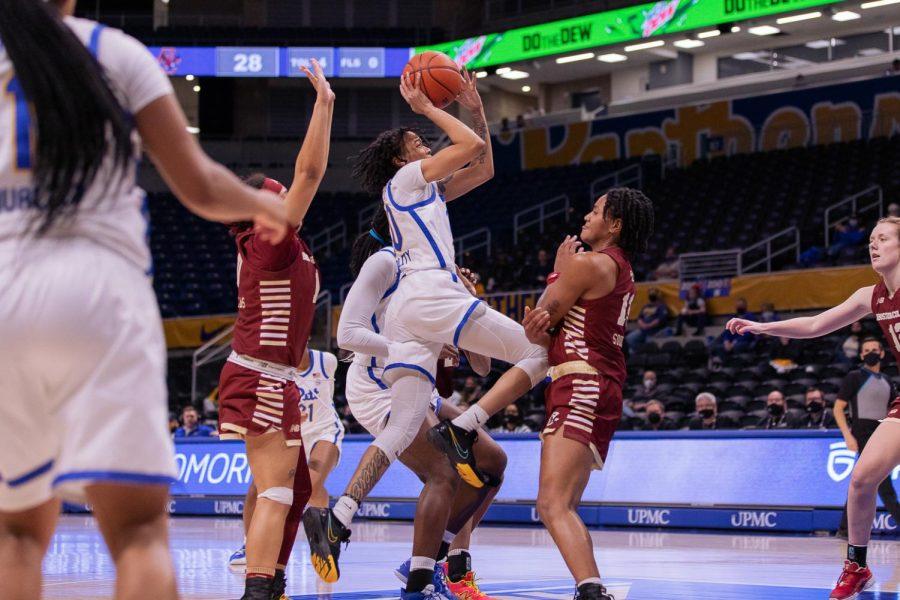Column | Panthers’ slide is product of costly turnovers, excessive substitutions
Hannah Wilson | Senior Staff Photographer
Senior guard Jayla Everett (20) takes a shot during the Pitt women’s basketball game vs. Boston College on Jan. 13.
January 18, 2022
Pitt women’s basketball (10-7, 1-5 ACC) notched its first conference win of the season against Wake Forest (12-6, 2-5 ACC) at home on Sunday. After stringing together quality wins in the non-conference portion of its season, Pitt struggled to get things going in the ACC. After a brutal first few games, Pitt now looks to change the narrative in the second half of the season.
The Panthers came into the season wanting to prove this wasn’t last year’s team. They were dominant in non-conference play, beating tournament-level opponents such as Northwestern and challenging other talented groups.
Head coach Lance White talked about wanting to coach a prolific offense this season and run the ball upcourt. Pitt was initially having a lot of success in transition, especially when junior guard Dayshanette Harris came back into the rotation after her ankle injury. The team remained committed to this strategy in conference play, but has seen limited success.
While Pitt continues to make substitutions early and often, fresh legs seem to be less and less important against ACC standout teams. The Panthers often rotate up to 13 players into the game, which appears to keep them fresh in its non-conference matchups. But in the ACC, the substitutions seem to generate confusion and turnovers.
Pitt has lost the turnover battle badly in most of their games this season. The Panthers sit at a -4.00 turnover margin, putting them last in the ACC. Many of these turnovers are missed passes and travels. Pitt shows solid ball security in transition, but struggles in the halfcourt to make concise decisions with the ball.
Unfortunately, the Panthers have struggled to stretch the floor this season. Senior guard Jayla Everett and junior guard Destiny Strother are the only true shooters on the team, as the only players to have made double-digit 3-pointers at this point in the season.
Pitt is shooting 30.1% on 3-pointers this season, but just 28.6% during conference play. Strother and Everett inflate these numbers — Pitt has virtually no shooting when these two aren’t playing. The Panthers’ meek record puts the team at No. 12 in the ACC in 3-point-shooting, a glaring problem for a group that loves to drive the ball and play fast.
The lack of a true perimeter scoring threat severely limits what players like junior center Rita Igbokwe and junior forward Amber Brown are able to do on the interior. Igbokwe is currently shooting her lowest field goal percentage of her Pitt career, at just 44.8%. The rest of the Panthers aren’t doing much better, shooting the second-worst field goal percentage in the ACC at 38.4%.
Despite the difficulty scoring, Pitt consistently outrebounds its opponents this season. The Panthers are chock full of athletic forwards and centers who can rebound the ball exceptionally well.
Sophomore forward Liatu King leads Pitt in rebounds with an average of 7.4 per game, and Igbokwe and Brown follow closely behind. Pitt as a team is second in total rebounds in the ACC and first in offensive rebounds.
It’s commonplace to see the Panthers battle it out on the offensive glass and generate second-chance points. Elite offensive rebounding helps compensate for Pitt’s lackluster shooting.
Another strength that has kept Pitt in contention in most of these games is its defensive intensity and Igbokwe’s strong presence in the paint. Igbokwe sits at No. 4 in the ACC in blocks, averaging 1.8 blocks per game. Pitt has a variety of talented perimeter defenders as well, including Everett, Harris and junior guard Emy Hayford.
Pitt looked destined to play basketball in March at the start of the season, after playing very well in the Paradise Jam games early in the year. But the start of ACC play has pushed it out of those conversations. The Panthers have yet to defeat a ranked opponent this season, and haven’t proved themselves as competitors in the ACC.
The non-conference play was a huge step for coach White and his team, but this team has a long way to go before they are ready to battle it out with the best in the ACC. Pitt had a win percentage of just 28.8% a year ago, and this season they sit above 50% — with the hardest stretch of their season behind them. Pitt isn’t quite a national contender, but they have certainly earned respect.
The next few matchups for Pitt aren’t quite as tough as its opening schedule, where they faced Notre Dame, Louisville and NC State. But there are no remaining non-conference games in the season, meaning each game will be vital to the team’s success.
Pitt travels to play Virginia Tech (12-4, 4-1 ACC) on Thursday at 8 p.m., and looks to build on its momentum from the win over Wake Forest. The game will be aired on the ACC Network.








